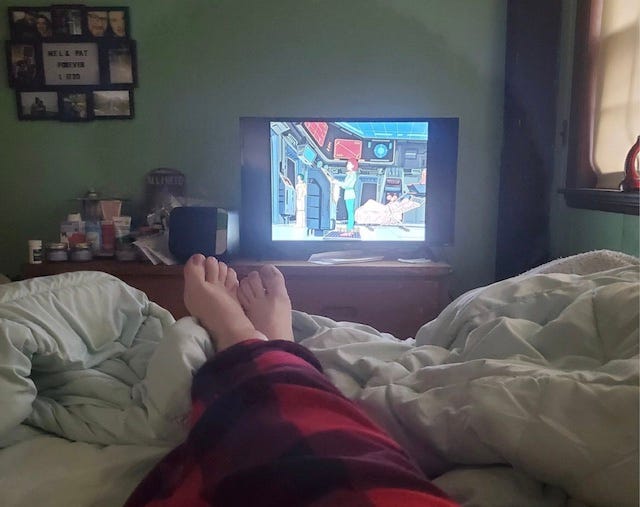Build Bridges, Not Walls: Create Connection Amidst Conflict
6 Principles to Minimize Conflict, Reduce Bad Feelings, and Prioritize the Relationship with your Kid
Parenting Matters #79
By: Catherine Lynch and Glenn Collins
Dear awesome parent,
Our 8 y/o grandson has Covid. His mom asked us to keep his sister for a few days so she wouldn’t get it. But she got it anyway. And now our daughter has it too. So now we’re waiting to get it. Fingers crossed. Stay safe out there.
6 Principles that Minimize Conflict, Reduce Bad Feelings, and Prioritize your Relationship with your Kid
“Put down the phone and clean up the mess you left in the kitchen.”
“How many time do I have to ask you to take out the trash?!”
“I told you to be home by midnight, and you rolled in at 2AM.”
Do any of these sound familiar? Like an interaction you’ve had with your kid lately? These, or similar versions, happened in our home when our kids were teens. Frequently! 😂
Conflict with your kids is unavoidable. They are, after all, distinct beings with wants, thoughts, and feelings of their own. There will be times (frequently!) when those are in conflict with what you think is best. And that’s normal. Different people want different things. And teens - well, they often want things that are very different from what their parents want.
A particularly memorable instance was when one of our teenage sons really really wanted a TV in his bedroom. This was against our house rules about TV’s - they’re only in the public part of the house. But we were working hard on creating a connection with him and it was clearly very important to him. So we compromised and let him have it in his room for the summer while school was out. The problem was that he conveniently forgot about the “while school was out” part and was furious when we moved it back to the living room at the end of summer. Talk about conflict! Anger. Drama. Bad attitude. We had it all!
Nobody likes conflict, especially when strong negative emotions like anger, shame, or resentment go along with it. And we really don’t like conflict with people we love, like our kids. Both sides can say or do things that lead to hard feelings, damage the relationship, and take a long time to heal - if they ever do.
So that begs the question: How do you handle conflict in a way that minimizes the bad feelings that can damage the relationship? And do so in a way that allows you to maintain your boundaries and values?
Luckily, we know a little bit about that because we adopted 5 teens from another country. We knew that if we ever wanted to become a family we needed to minimize conflict and the bad feelings that go with it. So our strategy from day one was view conflict through the lens of Prioritizing the Relationship. We knew this was the only way to get what we wanted: a family, a mostly drama-free home, and the ability to influence the hearts and minds of our kids - who didn’t really think they needed parents.
While there may be no one-size-fits-all solution, there are steps you can take to resolve conflict with a minimum of bad feelings and the most possible benefit for you, your kid, and your relationship.
We used 6 principles to help guide us through situations where conflict with our kids was possible. These principles allowed us navigate those challenges and come out the other side with our relationship stronger than ever.
Here’s the 6 Principles that Minimize Conflict, Reduce Bad Feelings, and Prioritize the Relationship:
How important is it? Have a clear idea of what’s worth getting into conflict over - and what’s not. If it’s not worth it, find another way to resolve the situation. If it’s important enough - and there are plenty of things that are - that’s OK. Stick to your values
.But do it as kindly as possible. Ask yourself: “Is getting what I want in this situation important enough to have conflict with my kid?What’s my frame of mind? Are you mentally and emotionally in the right frame of mind to have productive conflict? Conflict that doesn’t get out of hand and lead to you say something you regret? How about your kid? If you and/or your kid aren’t in a good frame of mind, can you put it off until you both are? If the issue has to be addressed right then and there, center yourself first and don’t get drawn down to your kid’s emotional level - especially if they’re not behaving as well as you’d like.
There are always multiple perspectives: You have your point of view, but so does your kid. Do you know what theirs is? Lay out your take on the issue so they can hear your position, not just your emotion. Make sure to tell them why it’s a problem for you. Ask for their perspective and truly listen. Don’t interrupt and don’t invalidate their feelings - even if you disagree with their interpretation. Their thoughts and feelings are as real and valid to them as yours are to you. Allowing them to express themselves lets them feel heard. Lets them know that what they think and feel matters to you. This can go a long way to taking the sting out of conflict.
Don’t make it personal: Stick to the issue at hand and don’t attack their character or personality. As much as possible talk about the problem in terms of your family’s culture and values.
Allow agency: The more they feel they’re participating in finding a solution, the more likely they are to go along with it. Is there a way to give agency in this situation? Can you ask them to take the lead in finding a solution that works for both of you? If none of their solutions work for you, offer them several options that are acceptable to you. This still gives them some agency, just not as much as they want. As a last resort you might have to impose your solution, but do it kindly and have empathy for their disappointment.
Clarify and follow through: Make sure everyone is clear on the solution, what’s expected, and the repercussions of not sticking to the agreed-upon solution. Be generous with your praise when they adhere to the solution but be prepared to follow through with the consequence or punishment. If you’re not willing or able to follow through with a consequence or punishment, don’t use it.
Remember: Conflict with your kids is normal and bad feelings happen, so be kind and give grace as often as possible.
Your greatest ability to influence your kids’ decisions comes from your connection to them. When your connection is damaged, your influence is greatly diminished.
P.S. You’re probably wondering how it all turned out with our son and the TV. Well, we took the TV out of his room. We told him our reasons and let him have his say. We empathized with his disappointment. We continued to concentrate on building our relationship with him. It was all fine in the end. And now we laugh because he’s a father and doesn’t let his own son have a TV in his room. 😂
Home Practice:
Talk to your spouse and identify the most common conflicts you have with your kids. Choose one of the easier ones to address with the above strategies in mind and work your way up to the harder ones. Let us know how it goes in the comments!
Whenever you're ready, there are 2 ways we can help you:
Are you a parent struggling with your kid's device use? Book a free half-hour call HERE and we’ll give you actionable strategies you can put in place immediately to bring peace and harmony back to your family.
Need personalized help implementing the parenting strategies from our newsletters? Join us live on Wednesdays from 12-1 EST. We’ll answer your questions, customize our strategies to your unique situation, and help you get your family back on track. Here's the Zoom link.
Our grandkids feeding goats
Our grandkids love farm animals so of course we stopped when we saw goats at a roadside stand on our way back from the beach on Labor Day. We put quarters into the gumball-machine-turned-corn-machine and it spat out a handful of corn. The kids, and the goats, were ecstatic.




